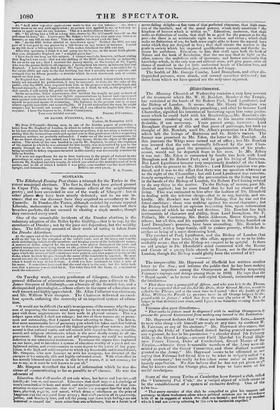The irrepressible Mr. Haywood of Sheffield has written another letter
to the Sun, and informs the public that he has been making particular inquiries among the Orangemen at Barnsley respecting Fairman's sayings and doings among them in 1832. He says that the " Royal agent," as he terms the self-styled Colonel, insinuated among the brethren- " That there was a young girl of fifteen, and who was heir to the Throne, but it was expected that not site, limit the Duke, their Grand Master, would be called to the Throne, and at the same time he &meted that the health of the King, William the Fourth (a previous toast in all Orange lodges) be dis- pensed with in future ;' which has been the case (by order of W. M.'s of lodges in that district) ever since, until I gave it on Saturday evening from the chair."
Fairman also gave directions-
" That oaths in future must be dispensed with in making Orangemen, to prevent the present Government from making any inroad in the Institution.'
Mr. Haywood declares that " these are incontestible facts,—known to men who along ‘Iith himself are ready at any time to confront IV. B. Fairman, or any of his abettors." Mr. Haywood also states, that although the Duke of Cumberland denied having granted warrants to any regiment, he has in his possession " a circular dated 7th February ISell, in the Grand Lodge,—present Field Marshal his Royal High- ness Peince Ernest, Duke of Cumberland, Grand Master of the Empire,—wherein three honourable members of the Army were ad- mitted as part of the Grand Committee, and three distinct warrants granted to the Army." Mr. Haywood seems to be affronted at ovr sityieg that Fairman had found him to be what is velgarly called "a rough customer;" but really he has taken some paitis to merit the homely appellation. We dare believe that he has not yet given its all that he knows about the Orange plot, and hope to have more of his useful revelattons.


























 Previous page
Previous page